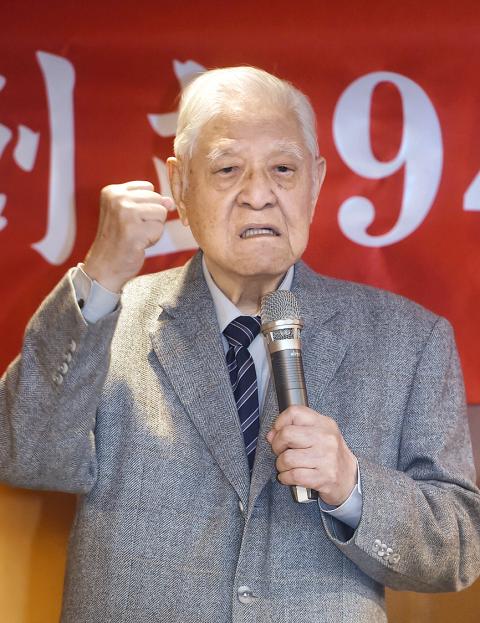Former president Lee Teng-hui (李登輝) yesterday followed up on his recent comments about President Tsai Ing-wen’s (蔡英文) cross-strait policy by reiterating his position on ending the “status quo” with China, saying that “Taiwanese understand that the nation has to walk its own path without fear.”
The statements came in the wake of his recent interview with Japan’s Sankei Shimbun, in which Lee attributed Tsai’s fall in popularity polls to her stance on maintaining the so-called “status quo” in relations with China, which Lee said is a deviation from popular sentiment.
“Taiwan is Taiwan, how can it maintain the ‘status quo’ with China? Taiwanese are opposed to that,” Lee said on the sidelines of an event in Taipei.

Photo: Fang Pin-chao, Taipei Times
Presidential adviser Koo Kwang-ming (辜寬敏), who also attended the event, said that 70 years ago there were only three independent nations in Asia and the rest were colonies, whereas today there are more than 20 sovereign nations in the region.
“Only Taiwan’s sovereignty is unclear,” Koo said.
If Tsai wants to talk about “maintaining the ‘status quo,’ then she should lay out a plan for the future,” Koo said, adding that failure to do so would be irresponsible.
As for his comments made in the same interview with the Sankei Shimbun, in which he said Tsai lacks courage and decisiveness, Lee said he was not criticizing her, but rather encouraging her to work harder.
Lee said that many problems remain unsolved, citing the lapses in Mega International Commercial Bank’s (兆豐銀行) internal management and controls exposed by the New York State Department of Financial Services’ announcement in August and a US$180 million fine of the bank’s New York branch for breaches of the US Bank Secrecy Act, pension reform disputes, labor disputes and the recent dissolution of TransAsia Airways Corp (復興航空).
Lee said problems such as those with TransAsia and Mega Bank are due to the handling of banking and financial matters by Chinese Nationalist Party (KMT) officials installed in their posts during the former administration, adding that Taiwan’s problems cannot be solved until these issues are dealt with.
In response to media queries on the Tsai administration’s performance over the past six months, Lee said the government is not handling the issues the public expects it to deal with, citing a drop in Tsai’s approval ratings from 50 percent to about 30 percent.
“[Tsai] must be careful in regard to the issues I just mentioned, otherwise her approval ratings will drop further. If she is not careful, she could end up like the South Korean President [Park Geun-hye],” Lee said.

Tropical Storm Gaemi strengthened into a typhoon at 2pm yesterday, and could make landfall in Yilan County tomorrow, the Central Weather Administration (CWA) said yesterday. The agency was scheduled to issue a sea warning at 11:30pm yesterday, and could issue a land warning later today. Gaemi was moving north-northwest at 4kph, carrying maximum sustained winds near its center of up to 118.8kph and gusts of 154.8kph. The circumference is forecast to reach eastern Taiwan tomorrow morning, with the center making landfall in Yilan County later that night before departing from the north coast, CWA weather forecaster Kuan Shin-ping (官欣平) said yesterday. Uncertainty remains and

SEA WARNING LIKELY: The storm, named Gaemi, could become a moderate typhoon on Wednesday or Thursday, with the Taipei City Government preparing for flooding A tropical depression east of the Philippines developed into a tropical storm named Gaemi at 2pm yesterday, and was moving toward eastern Taiwan, the Central Weather Administration (CWA) said. Gaemi could begin to affect Taiwan proper on Tuesday, lasting until Friday, and could develop into a moderate typhoon on Wednesday or Thursday, it said. A sea warning for Gaemi could be issued as early as Tuesday morning, it added. Gaemi, the third tropical storm in the Pacific Ocean this typhoon season, is projected to begin moving northwest today, and be closest to Taiwan on Wednesday or Thursday, the agency said. Today, there would likely

DISRUPTIONS: The high-speed rail is to operate as normal, while several airlines either canceled flights or announced early departures or late arrivals Schools and offices in 15 cities and counties are to be closed today due to Typhoon Gaemi, local governments announced last night. The 15 are: Taipei, New Taipei City, Taoyuan, Tainan, Keelung, Hsinchu and Kaohsiung, as well as Yilan, Hualien, Hsinchu, Miaoli, Chiayi, Pingtung, Penghu and Lienchiang counties. People should brace for torrential rainfall brought by the storm, with its center forecast to make landfall on the east coast between tonight and tomorrow morning, the Central Weather Administration (CWA) said. The agency issued a sea warning for the typhoon at 11:30pm on Monday, followed by a land warning at 11:30am yesterday. As of

CASUALTY: A 70-year-old woman was killed by a falling tree in Kaohsiung as the premier warned all government agencies to remain on high alert for the next 24 hours Schools and offices nationwide are to be closed for a second day today as Typhoon Gaemi crosses over the nation, bringing torrential rain and whipping winds. Gaemi was forecast to make landfall late last night. From Tuesday night, its outer band brought substantial rainfall and strong winds to the nation. As of 6:15pm last night, the typhoon’s center was 20km southeast of Hualien County, Central Weather Administration (CWA) data showed. It was moving at 19kph and had a radius of 250km. As of 3pm yesterday, one woman had died, while 58 people were injured, the Central Emergency Operation Center said. The 70-year-old